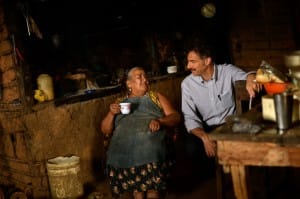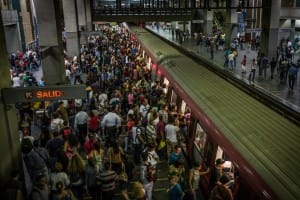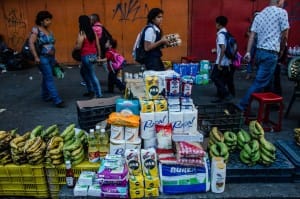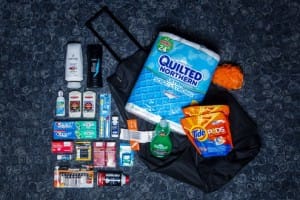
Moving to Venezuela, a Land in Turmoil
The New York Times correspondent William Neuman interviewed Leonarda Aranguren, 69, as she drank coffee from beans she grew and ground herself, in Portuguesa, Venezuela, in 2012. Credit Meridith Kohut for The New York Times
Nicholas Casey, a New York Times correspondent, is sharing moments from his first 30 days living in Caracas, a city in the midst of great tumult and change.
Saying ‘Goodbye’ and ‘Gracias’ to William Neuman
This week I said goodbye to the outgoing Times bureau chief, William Neuman – or “Wili” as he is affectionately known in Caracas.
I first met Willie at the Purity Diner in Brooklyn, this fall.
My editor, Greg Winter, had told me to be ready to pack my bags for South America by the New Year. Willie was in New York and I wanted to ask him about a few things I couldn’t quite square the circle on.
Someone from Caracas told me they took a taxi three blocks to work every day to avoid getting mugged. Someone else said he’d heard about a man getting attacked at the baggage claim in the Caracas airport.
I’d worked in some rough places before but I’d never heard of someone getting it at the baggage claim. Sure, Caracas was brimming with stories, but did Willie like Caracas?
“I love Caracas,” Willie said.
He had a big smile then, one I’ve learned to associate with Willie Neuman.
We didn’t talk much about Caracas’s crime, or the shortages or the political polarization. We talked about the things he liked about the city. The Ávila mountain he can see from the back of his house. The big tropical trees, the lovely weather.
The Caribbean Sea, which is only a short drive away.
Since I arrived here, Willie has been saying his goodbyes to Venezuela. But he has also taken time to show me the Caracas he fell in love with. It is a different one from the tortured city we must often write about in the news pages.
It’s the city where the big baseball stadium can be seen glowing from the bureau in the evening, the place he and I went to watch a game my first week here. The site of the big going-away party his friends threw last Saturday night. The place that sells the hot dogs, topped with grated meat, ketchup, mayo, mustard, cheese, dried onions and hot sauce, the ones that Willie adores.
“Con todo,” he says. “With everything.”
His love of Venezuela – and all the other parts of Latin America where he traveled – comes across in so many of his stories, and it was through Willie’s work that I knew him long before we met.
Thanks for everything Willie, and for these memorable tales.
Q&A: Is It Safe to Visit Venezuela?
We read about the increase in crime as the economy has deteriorated and respect for the government has declined. Is crime more of a problem for foreigners or for residents? Is it safe to visit the country?
—Bob Dulla, Sacramento
Crime seems to hit everyone here: poor and rich, foreigners and locals. But during this economic crisis, it’s those with money, especially those in the middle class, who say they feel particularly hunted.
Just this week, Maria, The Times’s longtime researcher in our bureau here, told me that she has been robbed twice at gunpoint, including a time in which her attackers tried to carry her away. Another group of armed men once tried to kidnap her son.
Part of being a foreign correspondent is the joy of having friends and family come visit you in your new life. But Caracas leads to some hard choices for correspondents on that front. I realize that my mother, who is 70, probably won’t ever meet me here. And if I had children, I wouldn’t have brought them.
I want my friends to come see me here. I want them to know that this is how a lot of the world’s people live, and that I’ve chosen to join them in living this way, at least for a time. But I know coming to Caracas, even for just a short visit, is a difficult decision.
The Caracas subway on Tuesday. A reader described the subway as «a wonderful thing; the last luxury we have left in this city.”Credit Meridith Kohut for The New York Times
The Caracas Metro: Rat-Free and Only a Half-Cent to Ride
There are no oversize rats dodging subway cars as they haul off pizza slices. No leaky pipes like the ones on the platforms in Times Square. And the trains don’t make that awful nails-on-a-chalkboard grinding sound each time they start moving.
As I’ve noted since I moved to Caracas two weeks ago, many aspects of life in Venezuela are surreal. Paying for office supplies requires loading a messenger bag with wads of cash. Some stores specialize in broken Chinese toys. And if you happen to stumble onto the floor of the legislature, just as the country’s lawmakers are getting sworn in, you might go unnoticed.
Yesterday evening, I came across another only-in-Caracas tale on Twitter: Venezuela’s National Guard had announced it had “detained” 3,300 diapers before they could be illegally resold on the streets of the capital’s largest barrio.
I went deep underground to find some normality. Riding the subway may be the one thing in Caracas that doesn’t feel surreal.
Caraqueños are deeply fond of the Caracas Metro, and it’s easy to see why. The stations look spectacular. They are clean, modern and well lit.
And in a city where buses regularly break down because Venezuela is running out of engine parts, it is the trains that usually run on time.
A reader recently described the subway to me as such: “It’s a wonderful thing; the last luxury we have left in this city.”
The subway is modest, with just four lines. But then again, Caracas is only a city of three million people, and the trains cover most of the territory.
If those four lines don’t get you where you need to go, you can try the Metrobus, a bus rapid transit system that links with the subway stops.
The fortunes of Caracas rise and fall with the price of oil. Petroleum is crashing now, and Venezuela is poor. But in 1983, the year these trains started operating, Venezuela was at the end of almost a decade of historic oil prices. Just as former President Hugo Chávez built houses for the poor when petroleum prices were high, Venezuela’s leaders during the earlier boom took to building the subway.
How does Caracas afford to keep its subways so clean and efficient today, during a time of economic hardship? It’s a bit of a mystery to me.
But it’s clear where the money is not coming from: the ticket price.
A ride in New York costs $2.75.
A ride in Caracas after subsidies costs one half-cent. And there are no rats included.
How much is a gallon of gas at the pump? Compare it with the price of bottled water.
—José Miguel Díaz, El Salvador
That’s a lovely question, and one that requires a little math:
One gallon of unleaded gas at 95 octane is about 0.36 bolívars in Venezuela. In dollars, that’s 5 cents at the official exchange rate. But on the black market, the exchange for dollars is even higher. The actual price is closer to 0.04 cents there.
One gallon of mineral water would cost you closer to 25 bolívars. That’s $4.09 on the official exchange rate. Paying with dollars on the black market, the actual price would be just less than 3 cents.
As you’ve probably guessed, José Miguel, there are big subsidies for gasoline in Venezuela, the country with the world’s largest estimated oil reserves. Gas is virtually free.
But the country is facing some water shortages, and bottled water can sometimes be hard to find.
Shoppers walked through a black market on the outskirts of Caracas in an effort to purchase hard-to-find products such as soap, shampoo, corn flour and rice. Credit Meridith Kohut for The New York Times
It’s time to say something about Venezuela’s famous black market.
I earlier wrote about what others had told me to pack for my move to Venezuela, given the country’s chronic shortages. Here’s my duffel bag unpacked of its conditioner, toilet paper, detergent and, of course, deodorant.
But what happens when the Old Spice runs out?
A lot of the goods you can’t find in a store are being sold on the street — for quite a markup.
Part of the reason soap is so scarce in Venezuela is because years of economic turmoil have left the country unable to produce some of the basics. But another reason has to do with subsidies and price controls.
The government was trying to help. During the presidency of Hugo Chávez, the government lowered the price of groceries and other goods to make them more affordable to poor people.
But hard times in Caracas have forced some residents to be crafty. They have realized there is a business in buying goods cheaply at the supermarket, and then reselling them at marked-up prices on the street.
Think of it like ticket scalping. But instead of concert tickets, it’s your eggs and milk.
“Those are bachaqueros,” said a new friend here, referring to the food scalpers by their local name. We were watching a line form in front of a grocery store. It’s a common sight in Caracas to see hundreds of people — both resellers and residents — waiting for hours outside a shop to get something basic, like a bag of coffee.
A bachaco is a little red ant that cuts and carries away leaves. Venezuelans turned the word into the name of a reseller, and then flipped it into its own verb, bachaquear.
Yo bachequeo, tú bachaqueas; I resell, you resell.
It has become a valuable service for middle- and upper-class Venezuelans who don’t want to take time off work to spend half a day in line to get groceries.
A couple of weeks after I arrived in Caracas, I decided it was time to meet some bachaqueros in their natural habitat.
I hopped onto the back of a motorcycle taxi, along with Meridith Kohut and Miguel Gutiérrez, two photographers on assignment for The Times, and we headed to the black market in one of Caracas’s biggest barrios, a neighborhood called Petare.
What does the black market look like? If you were expecting elephant tusks and deals in shady alleys, you would be disappointed. It looks like any informal market you’d see in Mexico City, Beirut or Harlem. There are a dozen tiny stands under an awning, each selling five or six products like toilet paper and shampoo.
But the prices! On the day we visited, the subsidized government price for a bag of black beans was 50 bolívars, about 6 cents. At the stands here, it was 700 bolívars, almost a dollar.
Neither price would be high in the United States, but it’s a different matter here. Teachers and government workers, for example, earn a minimum wage of just under 10,000 bolívars a month. It’s unlikely these black market beans will be on their menu anytime soon.
I started chatting with the bachaquera selling the black beans, a woman in her 40s who didn’t quite like the idea of being questioned about her business and had no desire to pose for a photo for Times readers. If the police come, the resellers must hide since what they are doing is illegal.
Why such a big markup? I asked her. She said that goes to the people who wait in line to buy the beans. She takes a cut too, of course. All told, it’s another way of making a living in a country where jobs are hard to come by.
That said, a Venezuelan can make bank as a bachaquero. Those we talked to said their profits were in the range of 200,000 bolívars a month, 20 times the minimum wage.
Still, their offerings were pretty slim. They sell only what they can find available in the shops. Eggs (500 bolívars), coffee (1,000), birth control pills (700), powdered milk (600) and a few other goods, all at big markups from the government prices.
The black beans woman was also selling what are the only two brands of shampoo available in this country, Pantene and Head & Shoulders.
And Old Spice? Nope. Not available. And I guess I shouldn’t hold my breath.




